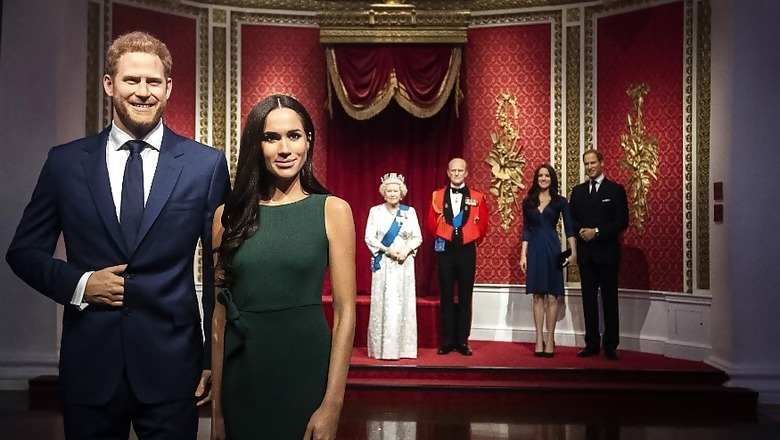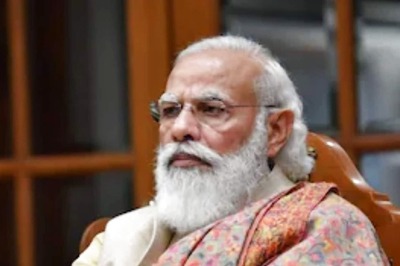
views
London: When Prince Harry and Meghan announced this week that they would be stepping back from their royal duties and spending extensive time in North America, many of Britain’s minority residents said they felt a burst of relief.
At long last, many said in interviews, the couple might finally escape the abuse, much of it racially tinged, that has been heaped upon them by the British press, particularly the country’s raucous tabloids.
“Thank God they are free,” said Sanaa Edness, lifting her arms to the sky as she walked through Fordham Park in southeast London. “Nobody should tolerate bullying and abusive behavior because of the color of their skin. All of this is about her race. I know it because as a Caribbean woman who did not grow up here, I have experienced it myself.”
It wasn’t supposed to end up like this.
When an African American bishop preached and a gospel choir sang at Meghan Markle and Harry’s wedding ceremony at Windsor Castle in May 2018, it set a precedent for many of Britain’s people of color, who until then had felt excluded from the profoundly white culture and traditions of the British monarchy.
Young black women with no particular interest in the royal family gathered around their televisions and watched with excitement as the beautiful biracial American actress walked down the aisle of St. George’s Chapel and became the Duchess of Sussex. They hoped that her union with the popular prince would mark a new era for the royal family, one that would usher in fresh and more relatable values.
But even before the wedding, Meghan had come under frequent attack in the British tabloids, prompting Harry, while they were dating, to issue a pointed statement condemning the “racial undertones” of opinion pieces and news articles.
And since the Daily Mail’s 2016 headline, “Harry’s girl is (almost) straight outta Compton”, the duchess has been the subject of dozens of racist and sexist stories with references to her “exotic DNA” and descriptions of her family history going from “cotton slaves to royalty via freedom in the US Civil War.”
After the couple married in 2018 and Meghan officially joined the royal household, the tabloids shifted gears, presenting her as a termagant who shouted at her staff and brought her sister-in law Catherine, the Duchess of Cambridge, to tears. Some headlines referred to her as “Hurricane Meghan,” the “Difficult Duchess” and “ME-GAIN.”
“They wanted to show her up as the angry black woman like a thorn against the sweet English rose petals that is Mrs. Kate,” Edness said.
In a rare ITV television interview broadcast in October, the duchess opened up about her struggles and acknowledged that her friends had warned her that if she married Harry, British tabloids would “destroy her life”.
The tabloids deny that their coverage shows racial bias, saying they have a right to scrutinize the couple when they are being supported by public funding.
“Most of the media is ignoring the whole racism factor that has clearly played a big role in the couple’s decision,” said Nadine Batchelor-Hunt, former president of Cambridge University’s Black and Minority Ethnic campaign.
“Racism issues are spoken about more in the popular discourse in the United States,” she continued. “People are more conscious of it, whereas here the black community is a lot smaller, and it’s not really raised as a significant issue regularly.”
In the latest census in 2011, black residents made up only around 3% of Britain’s population, with 87% white and the rest from other ethnic groups. In the United States, by contrast, non-Hispanic white people account for only 60.4% of the population in 2019, while black people were the largest minority at 13.4%.
Batchelor-Hunt also pointed out that royal correspondents and commentators are predominantly white. “Many of them are unaware when they are being outright racist and how their comments become amplified across social media,” she said.
In an opinion piece published in The New York Times on Thursday, Afua Hirsh, author of “Brit(ish): On Race, Identity and Belonging,” looked at the relationship between the coverage of the duchess and Britain’s class culture.
“In Britain’s rigid class society, there is still a deep correlation between privilege and race,” she wrote. “The relatively few people of color — and even fewer if you count only those who have African heritage — who rise to prominent success and prosperity in Britain are often told we should be ‘grateful’ or told to leave if we don’t like it here.”
In the interviews, a persistent theme was surprise that senior members of the royal family had not shown enough support for Meghan. Many said they have watched in astonishment as Buckingham Palace has released several statements in defense of Prince Andrew, who has been embroiled in a child sex trafficking scandal, while staying silent on the systematic attacks on the duchess.
“She didn’t get the support she needed from the royal family,” said Carol Lengolo, a mother of two from southeast London who grew up in South Africa as a big fan of the monarchy. “You never see them speaking out about the racism, standing beside her, defending her. She’s been all alone.”
Lengolo said she was happy and relieved that the couple would finally be free of all the abuse and negativity. She could not understand why anyone was surprised by the announcement.
“These people needed to do this for the sake of their mental health and to protect their newborn son,” she said. “I support them 100%. I’m truly happy for them.”
Tabloid columnists expressed shock and outrage at the announcement by Harry and the duchess Wednesday, accusing them, among other things, of being “selfish” and “scheming” “hypocrites” who had shown an “atrocious lapse of judgment” and were “trying to bring down the monarchy.”
“I’ve seen some disgraceful royal antics in my time, but for pure arrogance, entitlement, greed and willful disrespect, nothing has ever quite matched the behavior of the ‘Duke and Duchess of Sussex,’” wrote Piers Morgan, a columnist for the Daily Mail.
“I put inverted commas around those titles because I sincerely hope they won’t exist much longer.”
Popular black comedian Gina Yashere responded to Morgan’s column on Twitter saying, “Please. Every black person knew this was coming. Constant racist vitriolic abuse disguised as criticism.”
Morgan responded, “Oh Gina, stop being so ridiculous. The criticism of Meghan Markle has nothing to do with her skin color and everything to do with her being a shameless piece of work doing huge damage to our Royal Family.”
Lengolo’s 13-year-old daughter, Tshego Lengolo, sees it differently. She idolizes Meghan and hopes to be an actress in Los Angeles one day. She said that while she was disappointed the duchess would be distancing herself from the royal family, she was also proud of her for making such a “brave” and “powerful” decision.
“I think it’s just appalling how they can just judge someone by their skin tone,” Tshego said, her voice rising with emotion.
“Take Kate, for example,” she continued. “She got married to a member of the royal family, and we don’t hear much said about her. But all of a sudden, a person of color comes into the royal family, and everyone just jumps and goes after her. If she was white, she wouldn’t be treated like this, and that is just the cold reality.”
Ceylan Yeginsu c.2020 The New York Times Company


















Comments
0 comment